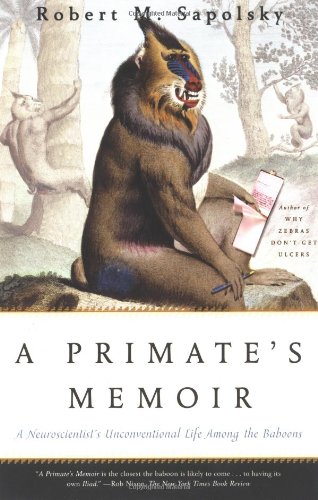Description
In the tradition of Jane Goodall and Dian Fossey, Robert Sapolsky, a foremost science writer and recipient of a MacArthur Genius Grant, tells the mesmerizing story of his twenty-one years in remote Kenya with a troop of Savannah baboons.
“I had never planned to become a savanna baboon when I grew up; instead, I had all the time assumed I would become a mountain gorilla,” writes Robert Sapolsky in this witty and riveting chronicle of a scientist’s coming-of-age in remote Africa.
An exhilarating account of Sapolsky’s twenty-one-year study of a troop of rambunctious baboons in Kenya, A Primate’s Memoir interweaves serious scientific observations with wry observation about the challenges and pleasures of living in the wilds of the Serengeti—for man and beast alike. Over two decades, Sapolsky survives culinary atrocities, gunpoint encounters, and a surreal kidnapping, at the same time as witnessing the encroachment of the tourist mentality on the farthest vestiges of unspoiled Africa. As he conducts unprecedented physiological research on wild primates, he becomes evermore enamored of his subjects—unique and compelling characters in their own right—and he returns to them summer after summer, until tragedy in any case prevents him.
By turns hilarious and poignant, A Primate’s Memoir is a magnum opus from one of our foremost science writers.
Robert Sapolsky, the author of Why Zebras Don’t Get Ulcers and other popular books on animal and human behavior, made up our minds early in life to become a primatologist, volunteering at the American Museum of Natural History and badgering his high school principal to let him study Swahili to prepare for go back and forth in Africa. When he set out to conduct fieldwork as a young graduate student, though, Sapolsky found that life among a Kenyan baboon troop was markedly different from his earlier bookish studies. Among other things, he confesses, he had to become a master of shooting anesthetic darts into his subjects with a blowgun to take blood samples, a mastery that required him to become “a leering slinky silent quicksilver baboon terror.” He also had to learn how to negotiate the complexities of baboon politics, endure the difficulties of life in the bush, and subsist on cases of canned mackerel and beans.
His memoir is, in the main, quite humorous, even supposing Sapolsky flings a few darts along the way at the late activist Dian Fossey–who, he hints, may have not directly caused the deaths of her beloved mountain gorillas by her unstable, irrational dealings with local people–and at local bureaucrats whose interests did not steadily coincide with those of Sapolsky’s wild charges. It is also full of good information on primates and primatology, a subject whose practitioners, it kind of feels, are constantly fighting to save species and ecosystems. “Every primatologist I know is losing that battle,” he writes. “They make me think of someone whose unlikely job would be to collect snowflakes, to rush into a warm room and observe the unique pattern under a microscope before it melts and is never seen again.” –Gregory McNamee













































